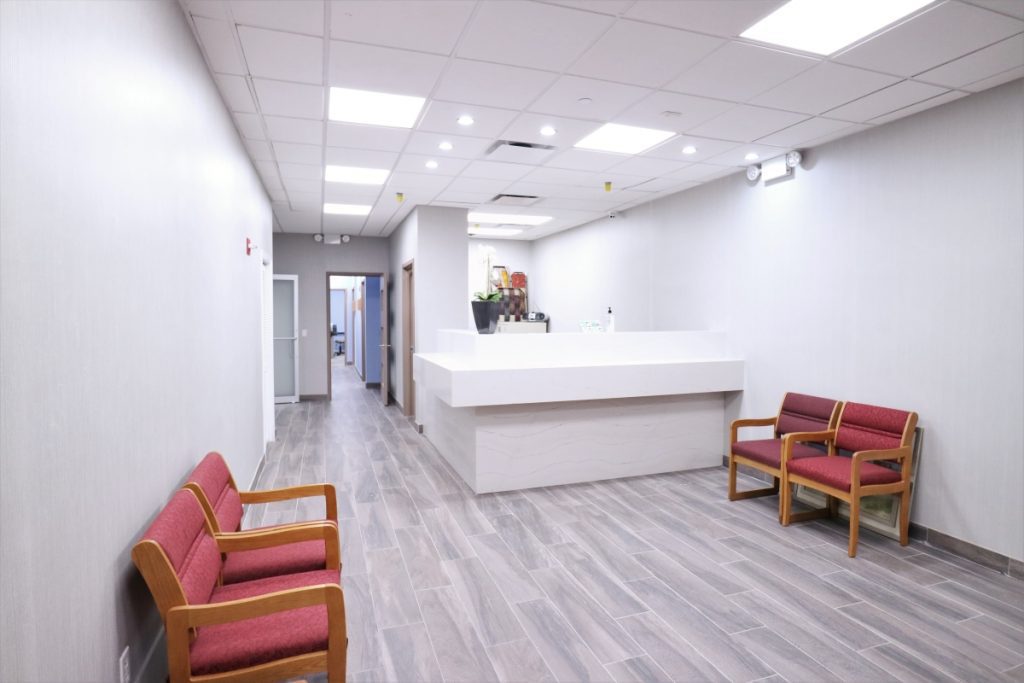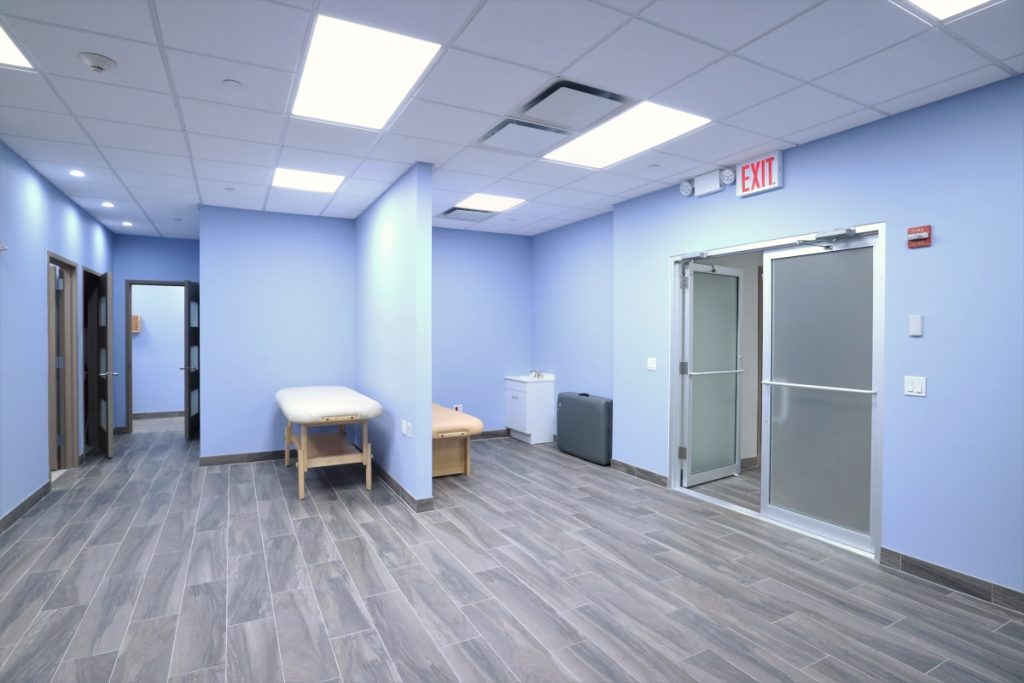
Define Your Medical Practice Needs
Before you even look at listings, clarify exactly what your practice needs. In NYC, medical tenants must consider:
- How many exam rooms, procedure rooms, lab space, waiting area, staff offices you’ll require
- Specialized infrastructure: medical gas, plumbing, HVAC, backup generators
- Accessibility / ADA compliance for patients with mobility issues
- Sound-proofing or partitioning for privacy in treatment rooms
- The need for sterilization zones, medical waste disposal, and reliable utilities
These are not luxuries—they’re essentials. Many medical office buildings in NYC were converted from standard office stock, so these upgrades may need negotiation.
Choose the Right Location & Neighborhood
Location is critical for a medical practice. You want to be accessible to patients, near transit, and ideally close to hospitals or medical anchors. Here are NYC neighborhoods and submarkets often favored by healthcare tenants:
- Midtown Manhattan: high patient traffic, visibility, many medical office buildings willing to lease to doctors
- Upper East Side / Upper West Side: close to major hospital systems
- Mixed-use buildings in neighborhoods like Murray Hill, Gramercy, Chelsea (often ground floors that allow medical use)
- In outer boroughs: Staten Island, Bronx, Yonkers also have medical office for rent / leases and are less expensive
Leasing medical space is resilient even during market downturns, thanks to stable demand in healthcare.
Also, current average leasing rates in NYC’s medical office space: for example, Upper East Side spaces command $60–$105 per sq ft in some cases. ( Source: Metro Manhattan)
Decide on Property Type & Building Class
Medical tenants in NYC may lease in a variety of property types:
- Purpose-built medical office buildings: designed for healthcare usage
- Converted office buildings: You’ll find that many landlords repurpose existing commercial office space for medical tenants.
- Mixed-use or ground-floor retail/office buildings: these can work for practices with walk-in patients, but may require a stronger build-out
- Medical office condos or co-ops: for practices aiming for long-term investment and control over the space
Each type has tradeoffs in cost, flexibility, and ease of conversion. Our experts mention that medical tenants often prefer buildings close to hospitals or in clusters of medical services.

Budget & Estimate Build-Out Costs
Once you find candidate spaces, you’ll need to budget not just rent but the tenant improvement (TI) costs:
- Plumbing, medical gas lines, waste disposal
- Electrical upgrades for imaging or specialized equipment
- HVAC, ventilation, filtration systems
- Partitioning, finish work, doors, sound insulation
- Permits and compliance with health codes
Some landlords may offer TI allowances or free rent periods to help offset your build-out costs. A broker experienced in medical office leasing will help you negotiate these terms.
Review Lease Structure & Key Terms
When evaluating lease contracts for medical office space lease, watch carefully for:
- Base rent + operating expenses / CAM charges
- Escalation clauses (annual increases)
- Renewal options and right of first renewal
- Tenant improvement allowances
- Exclusive use clauses (to prevent duplication of specialty in the same building)
- Use restrictions / permitted medical specialty clauses
- Assignment/sublet rights
- Termination provisions
Because medical practices invest heavily in build-out, you want flexibility and stability.
Inspect, Due Diligence & Zoning
Once you narrow to a few spaces, do thorough due diligence:
- Inspect mechanical, plumbing, and HVAC systems
- Check zoning and certificate of occupancy to ensure medical use is permitted
- Ensure code compliance (fire egress, accessibility, elevator capacity)
- Verify structural integrity (floor loading for heavy equipment)
- Check for existing medical tenants or shared use
Many building owners in NYC are cautious with medical tenants, so having a real estate partner who knows commercial medical real estate helps.
Negotiate & Sign Lease, Oversee Build-Out
After due diligence, your broker or counsel negotiates the final lease. Once signed:
- Oversee the build-out according to plans
- Schedule inspections and approvals
- Coordinate utilities, permits, medical infrastructure
- Move in and market your practice
We offer services and guidance in this process—helping physicians navigate NYC’s complex leasing and build-out phases.
Comparison: Medical vs Regular Office Space Demand
Feature | Medical Office | Standard Office |
Infrastructure Needs | Higher (plumbing, gas, HVAC) | Lower |
Permitting & Zoning | More complex | Simpler |
Rent per Square Foot | Typically higher | Lower in same area |
Lease Commitments | Longer term preferred | Can be shorter |
Tenant Resilience | More stable in downturns | More vulnerable to economic contraction |
Because of these special demands, medical office leasing often commands premium rents but also comes with higher barriers to entry.
Final Thoughts: Make Your Move with Unique Workspace
Finding the right medical office space in NYC depends on location, fit, and flexibility. With the right guidance, you can lease a space that supports both your patients and your practice.
At Unique Workspace, we simplify the process. From medical office buildings in Manhattan to doctor office spaces in Staten Island or the Bronx, our experts help you find, compare, and lease the right property—without the guesswork.
Ready to get started? Contact us and let’s find the medical workspace that fits your vision.
FAQs: Medical Office Leasing NYC
What is a typical square footage requirement for medical offices?
It depends on the specialty. Clinics might need 1,500–4,000 sq ft; surgical or imaging practices may require 5,000+ sq ft.
What is the average rent for medical office buildings in NYC?
Rates vary widely. In prime neighborhoods, you’ll see $60 to $105 per sq ft for medical space.
Are there medical offices for rent in Staten Island, Bronx, Yonkers?
Yes. While Manhattan is premium, practices often lease in Staten Island, Bronx, and Yonkers for lower cost. Search for “bronx medical offices for lease” or “yonkers medical offices for lease” listings in those submarkets.
Can I lease a medical space in a mixed-use building?
Yes, many medical practices are in mixed-use or ground-floor buildings, but you must confirm permitted use and negotiate build-out terms.
Should I buy or lease medical office property?
Leasing is more common to reduce upfront capital risk. Some larger or long-term practices consider medical office property ownership or condos if they intend to stay.